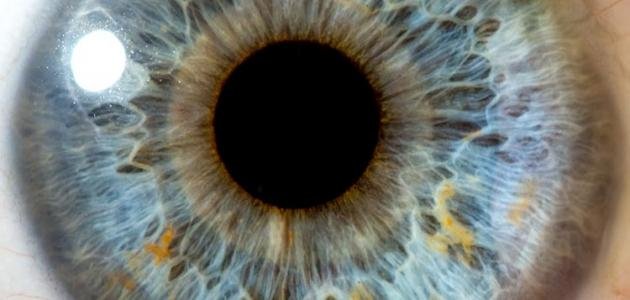Eye components
The front part of the eye is a fairly strong white outer layer and is covered with a thin membrane called the conjunctiva. The light enters the eye through the cornea. The cornea protects the front of the eye. It also focuses light on the retina at the back. The light passes through the cornea and enters the pupil, the circular black part of the eye. .

Ring Segment This ring segment (iris) controls the proportion of light entering the eye, by opening the iris and joining it. The iris allows more light to enter the eye when the place is dark and allows for a lower amount of light when the place is bright. The muscle of the eye muscle is the one that controls the size of the pupil that opens or closes the iris. Eye lenses are located behind the iris of the eye, and the lens of the eye focuses light on the retina, to see the objects close to the eye and the ciliary muscle contractions and the lens becomes thicker and therefore stronger ..
To see things far from the eye, the same muscle relaxes and the lens becomes louder and weaker. As the age increases, the lens becomes less flexible and less able to be thick, and thus less able to see nearby objects, a condition called the age of sight.
The retina contains special nerves that feel light and blood that nourishes the eye. The most sensitive areas of the network are an area called a corneal spot, which contains thousands of nerves that stick together at the end. The more intense these endings are, the clearer the retina will then transfer the visual images to electrical impulses sent to the brain via the optic nerve. The optic nerve connects the retina to the brain. Half of the nerve fibers move to the other side to reach the optic crucifixion, an area under the anterior part of the brain. Then the nerve fibers pool again before reaching the back of the brain, where the vision is felt and interpreted (translated into objects) To two parts, each section is filled with fluids. The front section of the cornea extends to the lens of the eye, and the back extends from the posterior limbs of the lenses to the retina.
The front part contains a sticky substance called glass liquid. These fluids help the eye maintain its shape. The front section consists of two chambers. The front chamber extends from the cornea to the iris, while the back extends from the iris to the lenses. The eye moisture is excreted in the back chamber where it passes through the pupil into the front chamber and exits the eye through the flow channels on the iris edge